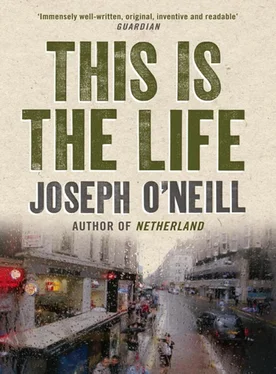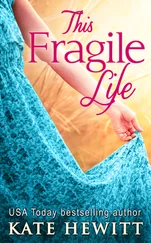‘Golf, Jim. You know what I do with my time? I play golf. Every free morning God gives me I’m up and going at those links. Do you play golf?’
I saw that I would have to answer. ‘I have played,’ I said.
‘Well, we should have a game sometime. When I’m at home I’m on those fairways every day, rain or shine. I play Ballybunion. Do you know Ballybunion? Marvellous course. When we came back from Switzerland, my wife wanted to go back to Limerick, I wanted to move to Ballybunion. So we compromised and went to a place called Askeaton. I live in the Old Rectory there. The old wreck, I call it. My wife’s dead,’ Mr Donovan said. ‘She’s been dead for six years now.’
Mr Donovan stopped talking to think about his dead wife. After a long silence, I decided to change the subject, and then to leave as soon as the next pause in the conversation arose. ‘Switzerland, you said?’
‘That’s right. Geneva. I worked in Geneva from 1946 to 1977. Thirty-one years. I was with the Glayer Corporation — you know, the American outfit. Nowadays they’re probably the biggest pharmaceutical company in the world, but in those days, when I joined them, they were just chickenfeed.’ Mr Donovan laughed. ‘Anti-anxiety drugs, that was my racket. Jesus, the crap people swallow these days.’ He folded his napkin into a neat triangle. ‘Mikey went to the International School. A grand school. They taught him three languages, French, Italian and German.’ He chuckled and began to boast. ‘He creamed the French at French and the Germans at German. He wiped the floor with the Italian kid at Italian. He skipped two years. He took his baccalaureate when he was sixteen. Mention très bien ,’ Mr Donovan said proudly. Three months later he got a scholarship for Cambridge. He had a great future ahead of him. That’s what everybody said. “Fergus, your son’s got a great future.” What the hell does that mean, a great future?’
He paused to reflect and I seized my chance. I thanked Mr Donovan for the meal and rose to go. He did not just shake my hand, he gripped it. ‘Don’t forget what I said,’ he said, looking me in the eye. ‘Use your initiative. Stay in touch.’
Walking back to the office, I resolved to avoid Mr Donovan like the plague.
Two days after my meeting with Mr Donovan, events took a bizarre, if not grotesque, turn’. I was at work and Mr Lexden-Page was sitting at my desk. I was trying to dissuade him from continuing his ill-judged action against the local authority responsible for the paving-stone he claimed to have stubbed his foot on.
‘The likelihood is that your claim will be struck out as frivolous and vexatious,’ I was explaining. ‘You will be forced to pay not only your costs, but also the costs incurred by the council. I can assure you that these will not be negligible. They could easily run into thousands of pounds.’
Lexden-Page said, ‘I don’t care how much it will cost me. I’m not in this for the money. There’s more to life than just money, Jones.’
I tried another tack. ‘Let’s take the best possible scenario,’ I said. ‘Let’s say we win.’
‘We will win,’ Lexden-Page asserted.
I spoke slowly. ‘Now, even if we manage to show that the council was negligent, we will be in great difficulty over damages. For a start, we have no medical certificate from a doctor regarding the injury to your toe.’ My words, I saw, were making no impact. Lexden-Page sat with his arms folded, gazing at the rooftops behind my head. Then there is the question of the shoeshine you’re claiming for,’ I persisted. There’s a problem with causation here: would you not have gone for that shoeshine in any event? Who’s to say your accident caused you to have a shoeshine you would not otherwise have had?’
‘It’s a matter of principle,’ Lexden-Page said. ‘I don’t care how petty the damages will be. I’m going ahead with it.’
‘Mr Lexden-Page, litigation is, for better or worse, all about money. The courts are unsympathetic to plaintiffs who simply seek to air a grievance. I advise you in the strongest terms to settle this matter or, better still, to discontinue it altogether.’ Lexden-Page plundered his ear with his little finger, which he then pointedly examined. Clearly he was having difficulties hearing me, so I decided to use more graphic language. ‘If you will pardon the expression, any money you pour into this action is money down the lavatory bowl.’
I froze.
‘Are you my solicitor or the council’s?’ I heard Lexden-Page say. ‘I pay my taxes, same as everybody else. The courts belong to me, d’you hear? Those judges are my servants.’
The episode in Donovan’s lavatory. The plastic bag full of turds and toilet-paper. I had left it in his house.
‘Why should I not be able to sue the bloody council just because I haven’t broken an arm and a leg? Was I the one who left the pavement in a shambles? A man can’t even walk down the street any more. What’s the point in living in a democracy, what’s the point of freedom, if a man can’t even walk down the street? Eh?’
I would have to go back. Hopefully the key would still be in the railing. The prospect of Donovan discovering the plastic bag did not bear thinking about.
‘Look here, Jones, you know what I want and I’ve heard your spiel. Now let’s get on with it. This whole business has been delayed enough.’
Feeling slightly unwell, I returned my attention to my client. Lexden-Page was about twenty-eight, although his puffy, rosy face suggested a younger man. He was wearing a tweed suit and circular spectacles. A transparent moustache grew hesitantly from his nostrils. He made grimaces as he spoke, twisting his mouth and wrinkling up his eyes into unpleasant, irritating contortions. He snorted.
‘Well? Are we going to see something happen or not? Or do I have to take my business elsewhere?’
He curled his nostrils, and I realized to my surprise that he filled me with loathing. My clients rarely made an emotional impact on me. ‘Whatever you say, Mr Lexden-Page,’ I said coldly.
I would leave for Colford Square immediately after work.
The keys were where I had left them, in the rust-cavity in the railing. Furtively I fumbled at the front door, trying the locks until the bolts gave way and clacked satisfyingly in the woodwork. I spotted the plastic bag immediately, a white translucent heap against the wall. Thankfully there was no smell. Quickly I picked it up and turned to leave. Then I stopped. Upstairs, I remembered, were the tapes and the notebooks.
Don’t go up there, I said to myself. Don’t do it. Just walk out of the door and go home.
Maybe it was the tension of the situation, I do not know, but all of a sudden I found it difficult to balance myself on my feet. My head spun slightly and I swayed from side to side, as if the house keeled and rocked on foundations of waves. So I stood still, leaning against the wall, breathing deeply. Then everything suddenly accelerated. Before I knew what was happening I had released the bag and was transported up the staircase, up to Donovan’s study. I found myself overtaken by events; I found myself in my raincoat, quickly inserting into the recorder the cassette I had played on my last visit. I replayed Tape 1, dated 25 September 1988, until I came to the tongue-twisters and the eerie, disembodied laughter, the point where I had stopped listening on that last night.
What I heard next was Donovan speaking in French. To my ear the accent was flawless and the sentences perfectly cadenced and modulated. It was practically a joy to listen to. I could not make head or tail of it.
I continued playing the tape. An authoritative chunk of German issued from the machine, followed by what sounded like a fluent outpouring of Italian (I could not be sure, my knowledge of these languages is almost non-existent). What was he saying? What message was he relaying?
Читать дальше
Конец ознакомительного отрывка
Купить книгу












